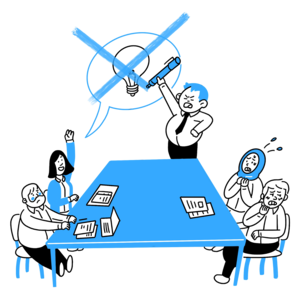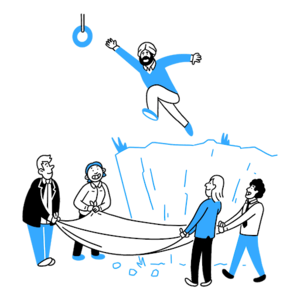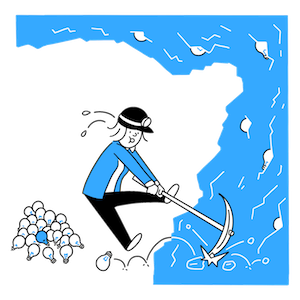Why Companies Need Improvisers
“We call it ‘The Idea Friendly Environment’ - a place of collaboration, discovery, and innovation.”
When you’re improvising you are using a set of skills that are incredibly valuable to any employer. I know this because some of the biggest, most forward-thinking companies in the world call on The Free Association to train their staff in business-specific improv skills! We’ve spent years developing a unique training programme for this, but you have those skills too - you just need to know how to practice them in a different environment. Next time you find yourself at a job interview, please don’t undersell your improv training. The techniques you practice on stage will make you a much more desirable candidate.
So what are the skills that you, as an improviser, possess and how do you transfer them into the world of business?
• You can communicate - Verbally, and non-verbally.
• You listen to what the other people are offering.
• You are flexible in your approach rather than pushing an agenda.
• You are innovative in your thinking - taking new, bold choices.
• You can adapt - change direction and move with the new flow.
• You are empathetic to your partner's needs.
• You don’t know what’s coming next, and you embrace that.
• You accept that sometimes it will fail.
• You have the confidence to do it anyway.
• Because you will do it as part of a team.
Our business training programme ‘The Idea Friendly Environment’ builds these skills within companies and it all started with a single concept.
“Don’t Bring a Cathedral, Bring a Brick - We’ll build it together.” - Del Close
Del Close was an improv pioneer in the 1960s who arguably laid the foundations for what improv is today, and has had a huge impact on The FA’s teaching philosophy. As an improviser, you ‘bring a brick’ every time you step on the stage - but do you do the same off-stage?
At work we may have the tendency, or feel the pressure, to try to develop an idea to the most minute detail - occasionally completely talking yourself out of the idea in the process - and only coming to the table with it when you’re 100% sure it’s fully fleshed out with an ironclad defence for its inevitable scrutiny. If we, or anyone in our team, fear that we’ll be looked down on for having an idea that’s wrong or not fully considered - then it’s much safer to not bring anything at all. This culture means that there will be a large number of unspoken ideas in the world… and they could be golden!
Regardless of the ‘industry’ you work in, it needs to be a creative one. Companies that aren’t continually being creative become stale and fall behind the curve.
Improvisation can help to build an environment for creative solutions. At The Free Association, we call it ‘The Idea Friendly Environment’ - a space of discovery, collaboration and innovation, and we lay the groundwork through a focus on 3 important principles.
1) Understanding the Impact of Rejection

We know how when one person’s idea is rejected, they will often be reluctant to put forward any other ideas - as will many of the other people in the room who have just witnessed the rejection. This is the dangerous ripple effect - nobody likes to be wrong!
The rejected person might also have 1, 2, 3 or 4 more suggestions in their head - they might not work either - but the 5th or 6th suggestion? Well, that might well be the winner. Or it might not - but even if that’s the case, one of the ideas along the way may have sparked something in someone else that leads to a unique solution. Sadly, the initial rejection, or ‘block’, will stop this process, dead, and as a result people often keep their voices to themselves.
As an improviser, you understand rejection, and it’s ripple effects in individuals and teams. You understand it so well you actively do the opposite: You accept ideas.
Improviser: 1
Other Candidate: 0
2) Encourage risk by Embracing Failure

Once we are conscious of rejection and its impact, and we have taken steps to reduce it - we need to undo an existing culture of fear and hesitancy by encouraging people to step forward and speak up.
We train teams to celebrate, support and encourage the brave person who comes up with that first, underdeveloped, possibly unworkable idea - after all, they have contributed the most. They’ve embraced failure, taken a leap and set the ball rolling.
Everyone plays a part in this! It’s much easier to be the risk-taker if you know you have a supportive team around you. We, as improvisers, are the people who will take the idea and - rather than judge it in an underdeveloped state, or for being ‘wrong’ - accept it, develop it and even follow the brave example and offer our own.
Improviser: 2
Other Candidate: 0
3) Mine Before We Refine

Now we’re flowing! We use the new environment, a shared language and an attitude of taking chances, acceptance and positivity to draw everything we can. Doing this enables us to arrive at new ways of looking at problems. They might be raw, early thoughts at this stage - but every groundbreaking discovery starts as a concept.
We ‘Mine, Mine, Mine’ for ideas. We mine every idea. Too many, in fact!
Once we’ve got a pile of wonderful ideas, only then do we start to refine for the nugget of gold. And, you guessed it - It’s much easier to do this as a team, too.
Inspiration, solutions or innovative thought rarely come out of the blue. It’s a chain reaction - ideas that develop, or trigger something inside each of you. They change, adapt and grow until finally.

In an ‘Idea Friendly Environment’, that final idea or ‘eureka moment’ does not belong to the person who said the words, but it’s the sum of all of its parts - the whole team.
As an improviser, this is a process you go through on stage every time you perform, sometimes unconsciously. The improv stage is the epitome of an Idea Friendly Environment - but imagine the benefits and, frankly, how much more wonderful and collaborative the working world would be if that was one too.
It’s what your employer wants - trust me.
Improviser: 3
Other Candidate: 0
If you think your team might benefit from The FA’s Idea Friendly Environment training programme - please hop over the www.improvatwork.co.uk for more details.
The illustrations in this post were created by the incredible artist, and FA Improviser, Luke Healy. You can view more of his work here.
Jonny is a Director at The Free Association and has worked with the company since it's conception. He has a finger in every pie (i.e, the theatre, production, school and business training)
Bio writing isn't a strong point.










